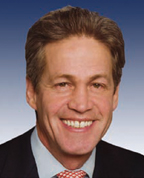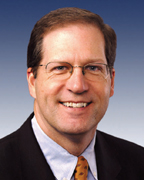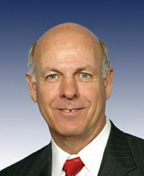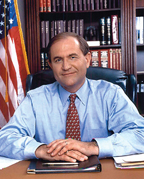With everything that`s at stake in the coming election, perhaps nothing is more important than our narrow pro-gun majority in the U.S. Senate. No matter how popular the president, a strong Senate can block anti-gun schemes ` or move pro-gun legislation ahead in the face of a veto.
The Senate is important when it comes to firearm legislation, but it is everything when it comes to `advice and consent.` The Senate must confirm every important appointment made by the president. Judges, cabinet members, ambassadors and agency heads`even the director of the Bureau of Alcohol, Tobacco, Firearms and Explosives`all must be approved by the Senate. And no treaty can be entered into without the consent of the Senate.
So the question is simple: Do you want federal judges hand-picked by Chuck Schumer and Dianne Feinstein? Do you want our representative to the United Nations to be selected by Richard Durbin or Hillary Clinton? Do you want Joe Biden moving to ratify a u.n. gun ban treaty?
If we lose our majority, that is what we face. A one-vote change in the Supreme Court and the Supreme Court`s Heller decision could be reversed. The wrong man at the U.N., and U.S. officials will start working with, instead of against, the radical anti-gun extremists that make up that body.
What`s more, the political situation in the Senate is extremely fluid. Over the past 50 years, political party control of the U.S. House of Representatives has changed hands just twice, in 1994 and 2006. The U.S. Senate, however, has changed eight times: 1980, 1986, 1994, 2001 (three times), 2004 and 2006.
Just in the past eight years, the greatest deliberative body in the world has changed leadership five times. And right now, the Democrats control the U.S. Senate by just one vote with a 51-49 seat majority (for organizational purposes, Independents Joseph Lieberman of Connecticut and Bernie Sanders of Vermont are counted as Democrats). However, gun owners enjoy a narrow majority of two or three votes. That is the majority we must protect and increase this year.
The leadership in the Senate`and many of the issues they consider`is decided by such small margins that every election has the potential to change the course of events in major ways. This will certainly be true in 2008.
The Big Picture:
A quick look at the numbers: Republicans currently hold 23 seats that are up for election, while Democrats hold 12. There are five open seats for retiring members--all currently held by Republicans. There are six seats considered to be toss-ups, with no clear favorite, all six currently held by Republicans.
The mainstream media focuses on the partisan breakdowns, but for gun owners, what counts is if there is a majority in the Senate that supports Second Amendment rights. Right now we have a narrow majority. Whether that majority holds will be decided by only a handful of races.
The 35 Senate seats up in 2008 break down like this:
Fifteen are in the hands of pro-gun incumbents and considered `safe`; that is to say, these incumbents are strongly favored to win re-election. This includes both Republicans and Democrats. In two states, open seat races are not considered likely to see a party change.
Nine are held by anti-gun incumbents who are not considered vulnerable.
That leaves 11 races that are considered competitive. It is in those 11 contests where the make-up of the Senate will be decided. And of those 11, pro-gun senators currently hold nine! Clearly, we have our work ahead of us.
Battleground Races There are tight Senate elections in Alaska, Colorado, Kentucky, Louisiana, Minnesota, Mississippi, Montana, New Hampshire, New Mexico, North Carolina and Virginia. A quick look at each of these races will give you a good idea of the challenge we face in holding on to our pro-gun majority in the Senate.
 |
Alaska Senator Ted Stevens, R--a former NRA director--is one of the most senior members of the Senate and a very valuable asset to gun owners. His long service includes unflinching support for the Second Amendment, and his seniority is a valuable asset for gun owners. As former chairman of the all-important Appropriations Committee and now the senior Republican in the Senate, he is in a key position to advance pro-gun legislation and to fight the anti-gun schemes that are certain to be introduced in the coming years. He is facing one of his strongest challenges in years and will need the help and support of gun owners to maintain his seat. |
 |
Colorado Sen. Wayne Allard, R, fought for gun owners during a long career in the U.S. House and Senate. His retirement leaves a void that gun owners will have to work hard to fill. The race is coming down to very pro-gun former Congressman Bob Schaffer, R, and Congressman Mark Udall, D. The race is considered a toss-up, and it is a top priority for gun owners to keep this seat in the pro-gun column. Bob Schaffer amassed an out-standing voting record on firearms and hunting issues during his five years in the U.S. House, voting to protect gun shows and to protect our hunting heritage. Congressman Schaffer would be a proven pro-gun successor to Senator Allard. |
 |
Kentucky One should never be surprised when partisan politics plays a big role in elections. This year, Senate Minority Leader Mitch McConnell, R, has been targeted, in no small part, because of his leadership position. The radically anti-gun Moveon.org, one of the best-funded political groups in the country, has made Senator McConnell a top target. Gun owners in Kentucky would be smart to give strong support to Sen. McConnell`s campaign as his record of support for gun owners has not wavered in nearly 25 years in the Senate. |
 |
Louisiana Louisiana provides gun owners with a rare opportunity in these tough political times: to defeat an anti-gun incumbent. Senator Mary Landrieu, D, has not represented gun owners in the Sportsman`s Paradise consistently on important firearm rights issues. She declined to sign a congressional amicus brief in support of individual Second Amendment rights in the Heller case and she voted to impose stiff federal regulations on gun shows. Her opponent, State Treasurer John Kennedy, R, has been a strong pro-gun voice in Louisiana and would be a consistent pro-gun supporter in the U.S. Senate. |
 |
Minnesota Since his election six years ago, Norm Coleman, R, has been a marked man. His political opponents hope to end his tenure in the Senate and have chosen the controversial comedian turned radio talk show host Al Franken, D, as his challenger. With his Hollywood politics and New York state of mind, Franken is certainly a foe of gun owners. His radical viewpoints and his outspoken personality would make him a bigger foe if he were allowed to take a seat in the U.S. Senate. Norm Coleman has an excellent pro-gun voting record and is a friend gun owners can count on because he believes in the fundamental Right to Keep and Bear Arms. Minnesota gun owners must take action now to preserve a valuable pro-gun voice in the Senate. |
 |
Mississippi It is a sign of the tough political times when a pro-gun incumbent senator from Mississippi is thought to be in danger. But Senator Roger Wicker, R, newly appointed after Senator Trent Lott`s retirement, is certainly in a tough race to hold onto the seat. With a strong record of support for firearm rights, Sen. Wicker can be trusted to continue to support gun owners in the future. Sportsmen and gun owners in Mississippi are the key to his election and should give his campaign their full support. |
 |
Montana Sen. Max Baucus, D, has become a valuable ally in the U.S. Senate, providing a pro-gun bridge to the Senate`s majority party. Senator Baucus has voted to support gun owners` rights on key issues, such as emergency powers legislation, the Protection of Lawful Commerce in Arms Act, opposition to the Clinton gun ban and ammunition bans and protection of gun shows from excessive federal regulation. The re-election of Senator Max Baucus will greatly help to protect the pro-gun majority in the Senate. |
 |
New Hampshire Senator John Sununu, R, has compiled an impressive pro-gun voting record during his first term in the Senate and, before that, during his three terms in the U.S. House. He voted consistently against the Clinton gun ban, to protect gun shows from heavy regulation and to end the D.C. gun ban. Senator Sununu has given the gun owners of New Hampshire a strong voice in the Senate, but his opponent would silence that voice. Former Governor Jeanne Shaheen, D, has a long record of opposition to gun owners` rights. During her tenure as governor, her increasing opposition to gun owners` rights caused her NRA-PVF grade to go from a `C` to a `D,` and kept slipping until finally, in her race against Senator Sununu in 2002, she earned an `F` rating. For those who care about the Second Amendment, the choice could not be clearer. Senator Sununu has earned the strong support of gun owners. |
 |
New Mexico With the retirement of long serving pro-gun Senator Pete Domenici, gun owners in New Mexico will have to do extra duty to protect their voice in the Senate. Two current U.S. Representatives will square off in this race. Steve Pearce, R, is the pro-gun candidate who will have a tough fight against anti-gun Tom Udall. On firearm issues, the two men stand worlds apart. On issues from reforming the Bureau of Alcohol, Tobacco, Firearms and Explosives, to the D.C. gun ban, to reckless lawsuits, Pearce supports gun owners` rights, while Udall opposes us. Even on hunting issues, Tom Udall votes against hunters` interests. It`s a simple choice: Steve Pearce is a strong voice for gun owners. |
 |
North Carolina Elizabeth Dole, R, is completing just her first term in the U.S. Senate. But in that short time she has delivered for gun owners on every key vote. She supported the Protection of Lawful Commerce in Arms Act, and has voted against bringing back the Clinton gun ban and against efforts to regulate gun shows. Senator Dole`s years of service in the federal government make her a valuable ally in the Senate, and her strong record has earned the enthusiastic support of gun owners in the Tar Heel state. |
|
|
Virginia With the retirement of anti-gun Senator John Warner, R, there is another opportunity for gun owners to increase their support in the Senate. Not only was former Governor Jim Gilmore, R, a strong supporter of gun owners` rights while in office, he has continued his support by becoming a member of the NRA Board of Directors. As governor from 1998 to 2002, Gilmore supported NRA efforts to establish Project Exile and was a strong advocate in Richmond. |
The Remaining Races Many pro-gun incumbents are running for re-election in other states, and although their races are not considered tight now, they have earned our strong support: Jeff Sessions, R-Ala., Saxby Chambliss, R-Ga., Pat Roberts, R-Kans., Thad Cochran, R-Miss., James Inhofe, R-Okla., Lindsey Graham, R-S.C., Tim Johnson, D-S.D., Lamar Alexander, R-Tenn., John Cornyn, R-Texas, Mike Enzi, R-Wyo. and John Barrasso, R-Wyo.
There are also two races for open seats where pro-gun candidates are expected to prevail, but gun-owner support is crucial. In Idaho, both Lt. Gov. Jim Risch, R, and former Congressman Larry LaRocco, D, have strong pro-gun credentials. And in Nebraska, former Governor Mike Johanns, R, is a strong advocate of Second Amendment rights and will be a valuable ally in the Senate.
The Bottom Line:
The narrow pro-gun majority is certainly in danger in the Senate. For gun owners, the division is not a partisan issue, but one of commitment to the Second Amendment. Gun owners are in a position to make the difference in every close race across the nation. If we do our part, we can protect our majority. We can`t `sit out` this election, because there is far too much at stake. And we need to do more than just plan to vote on November 4. We need to give our support to pro-gun candidates by volunteering our time and energy--and when possible our financial resources--to help those who will work to protect our rights.
















 More Like This From Around The NRA
More Like This From Around The NRA



